
14-Jun-2024 , Updated on 6/14/2024 4:39:54 AM
The Moplah Rebellion: A Clash of Cultures and Colonialism
The Moplah Rebellion of 1921 started as an uprising against British rule but quickly transformed into a violent clash between local Hindu landlords and Muslim peasants. Allegations of widespread atrocities emerged, claiming that Muslims killed over 1,000 Hindus, raped women, forcibly converted many to Islam, and destroyed temples. This complex conflict, deeply rooted in the region's history, warrants a closer examination.
Muslims first arrived in Kerala as Arab traders in the 7th century, intermarrying with local women and establishing a community known as the "Moplahs," meaning sons-in-law in Malayalam. In the traditional land system of Malabar, landlords, or Jenmis, held land and leased it to tenants for farming. However, British colonial policies disrupted this system by granting Jenmis absolute ownership rights, exacerbating tensions between landlords and tenants.
By the time the British introduced new land laws, the region had already experienced over 22 revolts, creating a volatile atmosphere. In 1920, the Congress party, during the Manjeri conference, supported the Moplah peasants' demands. Leaders like Mahatma Gandhi, Shaukat Ali, Hasrat Mohani, and Abul Kalam Azad initially offered their support. However, as the situation escalated into violence, these leaders distanced themselves instead of intervening.
In August 1921, the arrest of revered priest leader Ali Musaliar ignited widespread riots. Following the arrest of Congress leaders, Ali Variyamkunnath Haji led a revolt, targeting symbols of British authority and unpopular Hindu landlords. Reports indicate that many Hindus were killed, forcibly converted, and subjected to atrocities. Haji's actions have been described as genocidal by some historians, with C. Gopalan Nai documenting “The daily occurrences of murders, dacoities, forced conversions, and the humiliation of Hindu women during this period.”
Haji established an independent Malayali Muslim state in the Moplah region, imposing the Jijya tax on Hindus and ruling with undisputed authority. The rebellion ultimately weakened and ended in January 1922 due to the combined efforts of the Malabar Special Force and the Gorkha Armies.
The Moplah Rebellion is still a hotly debated part of history. At first, leaders like Gandhi supported the movement, but they backed away as it became violent. This withdrawal has been criticized, with some saying that if these leaders had opposed the violence more strongly, many Hindu lives might have been saved.
When looking back at the Moplah Rebellion, it is important to understand the complicated mix of cultural conflicts, colonial rules, and the tragic outcomes of a movement that started as a fight for independence but turned into brutal communal violence.

Student
I am a content writter !
Join Our Newsletter
Subscribe to our newsletter to receive emails about new views posts, releases and updates.
Copyright 2010 - 2026 MindStick Software Pvt. Ltd. All Rights Reserved Privacy Policy | Terms & Conditions | Cookie Policy